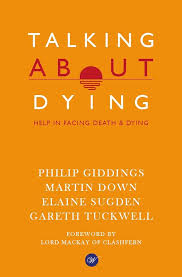Talking about Dying – Help in Facing Death and Dying
Philip Giddings, Martin Down, Elaine Sugden, Gareth Tuckwell
Wilberforce Publications, 2017, 182pp., pbk , £8.00
It remains somewhat of a persistent paradox that despite our faith in a crucified and risen Lord, Christians find it difficult to engage with, prepare for and reflect on death. I am constantly surprised in my educational work with a wide range of religious groups how little attention they have paid to death and dying.
This short, well-organised and carefully written book offers practical and spiritual guidance to those facing the death of a loved one, or their own terminal illness.
Giddings opens the book with a moving and insightful use of experience as he addresses the question: why and how do we need to talk about dying. Chapter 2 explores the different ways in which people respond to life-threatening illnesses. There is a grounded realism about the complexity of this dimension of human experience. Chapter 3, written by a doctor, considers how we go about talking to doctors and other practitioners about medical decisions. Sugden reminds us of our sometimes unrealistic expectations of both medicine and the medical profession. In this chapter, there is a helpful and clear discussion about advance directives.
Chapter 4 takes a practical, philosophical and ethical approach to the when, where and how of dying. A number of contested questions are addressed and the transformative work of palliative care professionals and hospices is also dealt with. Giddings offers the fifth chapter from the heart-breaking experience of the sudden death of his wife. There is a wonderful sensitivity and carefulness about this chapter, which bears witness to his humanity and faith. Chapter 6 addresses the difficult tragedy of suicide and chapter 7 the death of a baby. Chapter 8 considers the particular challenges associated with the diagnosis of a terminal illness in children.
Chapter 9 considers a Christian view about death heaven and hope. Chapter 10 explores how we face up to our fears in their many dimensions. Tuckwell in chapter 11 considers healing from his significant experience at Burswood. Chapters 12 and 13 along with three appendices offer practical assistance relating to putting our affairs in order, preparing for an unexpected death and making a will. Both Sugden and Giddings speak from the body of their own experience in exploring how we journey alongside those living with the bleak news of a terminal illness. The book also includes a list of helpful websites and sources of further information.
All in all this is an extraordinarily good book where all the writers offer a creative synergy between personal, pastoral and professional experience. Their desire to help and support with information, a gentle questioning alongside a deeply rooted Christian faith. This will make this essential reading for my ordinands and others wishing to ensure that their thinking and practice in Pastoral care is informed and spiritually intelligent.
The publishers are to be congratulated on a clear and usable text produced economically and offering the reader very good value for money.

